Write Christmas
by Brett Marie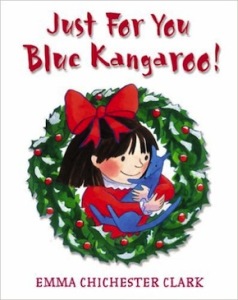
The season has come for making merry; it’s time to think of the books that prop open my heart so the Christmas spirit can get in. The book that opens it wider than any other is one that I read to my Miss Marie without fail each December, Emma Chichester Clark’s Just for You, Blue Kangaroo! The sixth in the series about a little girl named Lily and her rhyme-inspiring stuffed kangaroo (notable titles: I Love You, Blue Kangaroo!; Where Are You, Blue Kangaroo?; and my favourite, It Was You, Blue Kangaroo!), this one chronicles Lily and her toy’s first Christmas together. As each holiday tradition unfolds in front of her, Lily declares it all “Just for you, Blue Kangaroo!” Blue Kangaroo clearly appreciates having all of this love directed at him (Clark’s delightful, vividly-coloured paintings capture his feelings perfectly with the tiniest stuffed-animal smile), but his delight is tinged with the regret that he can’t return all these tokens of affection.
Blue Kangaroo gets help in solving his problem from a predictable source, but the real miracle in Just for You, Blue Kangaroo! doesn’t arrive with Father Christmas. Clark’s genius is in permeating her work, beginning to end, with little miracles. Snow falls in time for the holiday. Relatives come together to celebrate. A young girl lets a new friend in on all the tiny joys of her life. The book’s climax doesn’t come when the big fat man makes it down the skinny little chimney; it comes when that new friend, somebody without any real means, finds a way to give back to the person who’s given him so much. It’s that moment that amplifies all the tender moments that come before it, and makes a reader – young or old – appreciate them for what they are: miracles all, hidden in plain sight.
As I reached up to that familiar shelf this year, it occurred to me to cast about among the authors of some of my favourite books written today for ideas to broaden my holiday reading, asking which stories they keep coming back to and why. Their choices were varied, and anything but predictable (no A Christmas Carol here), but all shared one thing in common: each one got me excited to read the chosen work, giving me that same rush of anticipation I used to get from looking at the book-shaped packages that lay in red-and-green wrapping beneath the tree.
Kim Echlin
I read a lot and there is something about the cosiness of Christmas that reminds me of the pleasures of childhood books. Before I could read, my paternal grandfather used to mail me watercolour panels that told the stories of Terry and Bingo, a little girl and her dog who had adventures not dissimilar to my own. On a separate page he wrote the words which were read to me, and soon enough I learned to decipher them. Terry was always getting her clothes dirty and trying to take care of her little brother. She had to figure out things like the first day of school and how to get across mud puddles. These little stories painted and written for me by my favourite grandfather were an immeasurable gift of love as he shared his own joy in storytelling. When I began to write him letters I’d complain that I didn’t know what to write. He mailed me a little red dictionary to help with the spelling part and asked me to describe specific scenes like breakfast or my walk to school. I think his interest in what seemed very ordinary made me begin to observe life carefully, a habit that has lasted throughout my life.
Chekhov takes us with unmatchable deftness into our shared humanity… these stories drop us into careworn hearts, hope and hopelessness, our frailties, our small moments of triumph.”
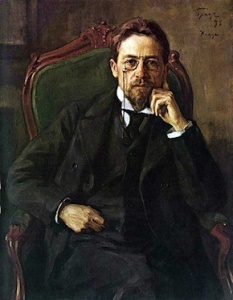 These are the dark days of the year, and full of holiday distractions – and bleak politics. This year for Christmas reading, I will return to Chekhov’s short stories, the right length to read late at night or in a quiet moment in the day. Chekhov takes us with unmatchable deftness into our shared humanity. Across geography and politics and language and translation these stories drop us into careworn hearts, hope and hopelessness, our frailties, our small moments of triumph. Anyone who writes can always pick up a few tricks about observing well and writing with economy by reading Chekhov. A story to start might be ‘At Christmastime’ which tells of a daughter separated from her parents and home after marriage. Unsent letters, illiteracy and domestic fear weave together and prevent the girl and her parents from communicating with each other. The daughter has three children and her mother and father do not even know they are grandparents. Finally the old mother hires a partially literate man to write a letter that does not really say what she hopes to say but nevertheless she walks seven miles to post it. And it is a letter in which the words do not much matter. The daughter receives it with such joy that her village and childhood are evoked for her and she describes to her children the place of her birth. Christmastime is always about wanting to be with our loved ones, and with those from whom we have been separated. Chekhov takes us into the heart of that longing.
These are the dark days of the year, and full of holiday distractions – and bleak politics. This year for Christmas reading, I will return to Chekhov’s short stories, the right length to read late at night or in a quiet moment in the day. Chekhov takes us with unmatchable deftness into our shared humanity. Across geography and politics and language and translation these stories drop us into careworn hearts, hope and hopelessness, our frailties, our small moments of triumph. Anyone who writes can always pick up a few tricks about observing well and writing with economy by reading Chekhov. A story to start might be ‘At Christmastime’ which tells of a daughter separated from her parents and home after marriage. Unsent letters, illiteracy and domestic fear weave together and prevent the girl and her parents from communicating with each other. The daughter has three children and her mother and father do not even know they are grandparents. Finally the old mother hires a partially literate man to write a letter that does not really say what she hopes to say but nevertheless she walks seven miles to post it. And it is a letter in which the words do not much matter. The daughter receives it with such joy that her village and childhood are evoked for her and she describes to her children the place of her birth. Christmastime is always about wanting to be with our loved ones, and with those from whom we have been separated. Chekhov takes us into the heart of that longing.
Jenn Ashworth
As soon as the mornings start getting frosty and the afternoons darken, I start reading ghost stories – there’s something festive about them, and each winter I discover new treasures and reread old favourites. A ghost story I consistently return to is ‘The Beckoning Fair One’ by Oliver Onions (apparently, he liked it pronounced Oh-NI-Uns), first published in 1911. The story starts softly with a writer, languishing in obscurity, facing poverty and procrastinating the completion of a novel he’s convinced will make his name and his fortune. He decides he’ll be able to work better if he moves house, and that’s where the fun begins.
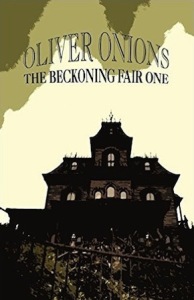 The ending – I won’t spoil it – shocks me even now I know what’s coming and moves this story from a pretty funny account of his house-move (I love all the detail of his domestic objects, his arrangements for meals, his endless decorating) to a kind of creepy, uncanny horror that reminds me a little of Robert Aickman, but is entirely his own. Also worthy of note: the strange relationship/friendship he has with Elsie. She’s ten years younger than him, a pretty and successful journalist, and someone he’s pretty sure he could marry at a moment’s notice if he bothered to ask. Her function in their friendship seems to be to listen to his drafts and reassure him that of the two of them, he’s the real writer, but there’s more to her than meets the eye.
The ending – I won’t spoil it – shocks me even now I know what’s coming and moves this story from a pretty funny account of his house-move (I love all the detail of his domestic objects, his arrangements for meals, his endless decorating) to a kind of creepy, uncanny horror that reminds me a little of Robert Aickman, but is entirely his own. Also worthy of note: the strange relationship/friendship he has with Elsie. She’s ten years younger than him, a pretty and successful journalist, and someone he’s pretty sure he could marry at a moment’s notice if he bothered to ask. Her function in their friendship seems to be to listen to his drafts and reassure him that of the two of them, he’s the real writer, but there’s more to her than meets the eye.
‘The Beckoning Fair One’ is a world away from Stephen King’s The Shining but with its interest in creative process, blocks, the difficulty of writing and the domestic practicalities of the writing life, I wonder if King read it before he wrote his seminal bestseller.
Megan Bradbury
Every year, in the lead-up to Christmas, I feel the need to reread The Box of Delights by John Masefield. Published for the first time in 1935, this children’s fantasy novel follows the adventures of Kay Harker, a young boy who is entrusted with a small magical box that holds special powers, and which he must keep from falling into the hands of evil Abner Brown and his gang.
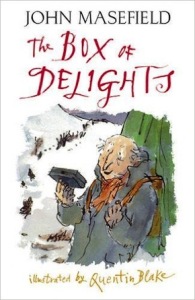 In my opinion, this is one of the greatest novels of all time and contains all the things I want to read about at Christmastime – adventure, wonder, magic, steam trains, secret passages, kidnap, treasure and criminal gangs. Kay is an active hero, risking his own life to save the lives of others, without any help from adults. The book captures perfectly what it is like to be a child – seemingly helpless, vulnerable and weak, yet in reality independent, wilful, autonomous and powerful. Masefield’s writing is exquisite – literary, warm and witty, and this book inspires the child in me.
In my opinion, this is one of the greatest novels of all time and contains all the things I want to read about at Christmastime – adventure, wonder, magic, steam trains, secret passages, kidnap, treasure and criminal gangs. Kay is an active hero, risking his own life to save the lives of others, without any help from adults. The book captures perfectly what it is like to be a child – seemingly helpless, vulnerable and weak, yet in reality independent, wilful, autonomous and powerful. Masefield’s writing is exquisite – literary, warm and witty, and this book inspires the child in me.
Will Schwalbe
For me, Christmas is a time when my normal insomnia becomes epic. During the rest of the year, it’s not unusual for me to be awake in the middle of the night for an hour or two or three. But in winter, in the nights leading up to Christmas, I often find myself wide awake mere minutes after I’ve put my head down on the pillow. And this is the kind of wide awake that leaves no doubt that I will get no sleep until dawn, when, curiously, exhaustion takes over and I can get an hour or two of shut-eye.
So during these winter sleepless nights, I get up and wander around our apartment (it’s small, so there’s not far to go). After I settle in a chair in the living room, I find myself wanting to read poetry. There’s a practical reason for this. With poetry, I can imagine that after one or two or three poems, maybe I’ll be sleepy. With prose, there’s the danger I’ll be so drawn in that despite sleepiness I’ll push on to the end of a chapter and past the moment where I can still get some rest.
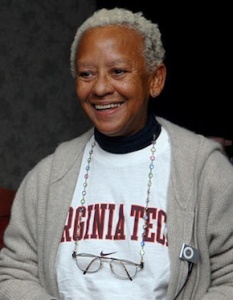 Nikki Giovanni is one of my favourite poets, and there are books of her poetry in all three rooms of our apartment. So every Christmas, on at least one sleepless night, I find myself reading her wonderful poem ‘Christmas Laughter’. In this poem, she writes about a ‘small’ family of eleven, describing the games they play and the foods they eat. It’s never is a good idea to summarise a poem, so I won’t, but I will tell you that this poem ends with an image of Santa that makes me smile every time I read it (you simply have to read it). The last word of the poem is laughter.
Nikki Giovanni is one of my favourite poets, and there are books of her poetry in all three rooms of our apartment. So every Christmas, on at least one sleepless night, I find myself reading her wonderful poem ‘Christmas Laughter’. In this poem, she writes about a ‘small’ family of eleven, describing the games they play and the foods they eat. It’s never is a good idea to summarise a poem, so I won’t, but I will tell you that this poem ends with an image of Santa that makes me smile every time I read it (you simply have to read it). The last word of the poem is laughter.
‘Christmas Laughter’ is the kind of poem that makes you want to reread it the second you finish. It brings out that childlike impulse we all had with our favourite books: Read it again, Read it again. Nikki Giovanni is one of my favourite poets for more reasons than I can name (or, rather, as many reasons as there are Nikki Giovanni poems). She’s a poet who was at the centre of the Black Arts movement in the late 1960s and early 1970s and has never, thank goodness, lost her righteous anger and her ability to turn her laser-like language to blasting worthy targets. But she’s also a poet of joy and of family and of childhood and of love. And this is one of the sweetest, most loving, most joyful poems I know. So that’s why it’s the perfect poem for Christmas, both sleepless nights and grateful days.
Kim Echlin is the author of Elephant Winter, Dagmar’s Daughter, Inanna: From the Myths of Ancient Sumer, The Disappeared and Under the Visible Life. She lives in Toronto.
serpentstail.com
Jenn Ashworth is the author of A Kind of Intimacy, Cold Light, The Friday Gospels and Fell, and lectures in Creative Writing at the University of Lancaster.
jennashworth.co.uk
@jennashworth
Megan Bradbury was born in the United States, grew up in Britain and has an MA in Creative Writing from the University of East Anglia. Her first novel is Everyone is Watching.
@_meganbradbury
Will Schwalbe is the author of Books for Living and The End of Your Life Book Club, and the founder of Cookstr.com.
willschwalbe.com
@WillSch
 Brett Marie, also known as Mat Treiber, grew up in Montreal with an American father and a British mother and currently lives in Herefordshire. His short stories such as ‘Sex Education’, ‘The Squeegee Man’ and ‘Black Dress’ and other works have appeared in publications including The New Plains Review, The Impressment Gang and Bookanista, where he is a contributing editor. He recently completed his first novel The Upsetter Blog.
Brett Marie, also known as Mat Treiber, grew up in Montreal with an American father and a British mother and currently lives in Herefordshire. His short stories such as ‘Sex Education’, ‘The Squeegee Man’ and ‘Black Dress’ and other works have appeared in publications including The New Plains Review, The Impressment Gang and Bookanista, where he is a contributing editor. He recently completed his first novel The Upsetter Blog.
Facebook: Brett Marie
@brettmarie1979

